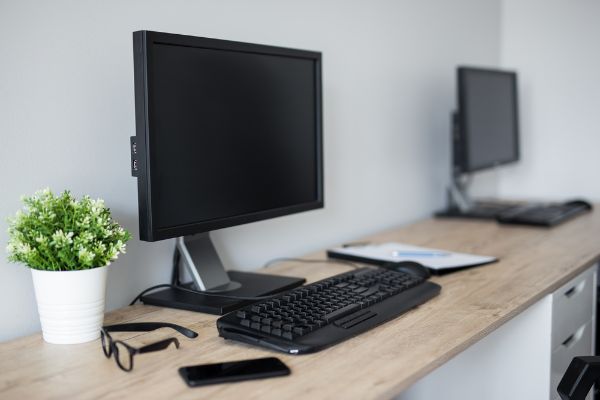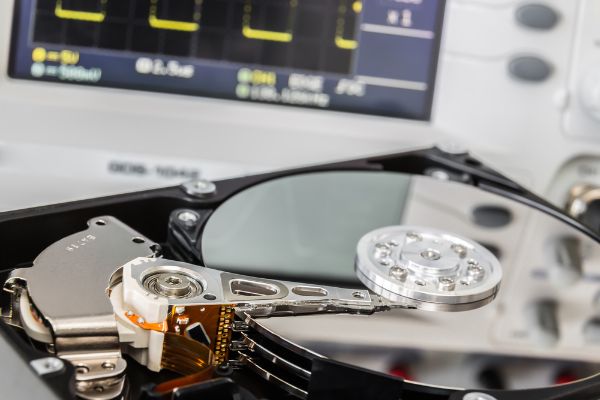Disclaimer: This post may contain affiliate links, meaning we get a small commission if you make a purchase through our links, at no cost to you. For more information, please visit our Disclaimer Page.
Often something people in the tech world choose to abbreviate as just HDD, the hard disk drive of your computer is where the system stores all of its data. This information includes the operating system, various programs it needs in order to function, other apps that you may have added to it over time, instructions on how the system should function, and files or folders that contain several types of media you might use on a daily basis.
Clearly, the HDD is a crucial component in the proper running of a computer. In most cases, you will use a particular function to shut down the system when you are done with it. This is the proper way to turn off the computer completely.
However, you can also force the system to shut itself off just by pressing and holding the power button on the computer. Some users wonder if doing this can cause any damage to the hard disk drive. We will do our best to answer this question as the topic of today’s article. Additionally, we’ll talk about the possibilities of repeated sudden shutdowns, particularly in how they might cause more damage to the drive.
This section will move into other kinds of things that can hurt the HDD, and we will also talk about how easy or difficult it might be to damage the HDD. Although hard drives don’t turn off the same way computers do, we’ll talk about how they might shut down if you are not using them, too.
Table of Contents
Can a Hard Shutdown Damage an HDD?
Before we begin, we should go over a couple of details that are important to HDD(hard drive) shutdowns.
First, there are times when you may need to force the hard drive to shut down. Usually, this is because the computer is unresponsive and you need to shut everything down in order to try to restart the system.
Although rare, this might be an unavoidable occurrence that you encounter once or twice throughout the life of your computer. For the purposes of our discussion today, this will be what we call a hard shutdown.
Additionally, there are times when your system might shut itself off with no intervention from you. Although some effects can be similar to a hard shutdown that you initiate, some of the causes may be different.
Because of this, we will refer to system problems like this as sudden shutdowns rather than hard ones, and we will use this as a way to discuss possible problems in both.
The steps you might need to take to resolve any problems you find could be different, but it would depend on what kind of shutdown your system has gone through.
To begin properly, a hard shutdown once or twice on occasion should not affect the computer very much. As we mentioned, you may need to do this, and most developers build safeguards that should protect both the components and sudden losses of data.
Having said that, the probability of damage to the hard drive and other storage spaces is not zero, and this is true even if you only need to perform a hard shutdown once over the lifetime of your computer. While things should be fine, there is always that potential for damage.
Having said that, most modern systems build in protections from forced shutdowns. The manufacturers plan for these things to still follow a particular series of events, and this is so that the hardware inside your computer stays safe. The main risk is to the data that some of that hardware stores, and that is why we need to discuss hard drive damage today.
Forcing your computer and drive to shut down quickly is not good for the HDD, but it should still park itself when this happens. For traditional hard drives that spin on a platter, you will probably hear them turn off when you shut down the machine. The usual whirring sounds from the drive should slow before ceasing.
Once this happens, it is a signal that the head of the drive has moved to its usual position when it is in an inert state. Although hard disk drives are our focus today, solid-state drives also tend to stay safe if you need to shut them down forcibly.
If you do need to perform this procedure, we recommend that you do so using only the power button. As we mentioned earlier, holding down this button will cause the computer to shut itself off, regardless of what operations it is in the middle of at the time, and it can do this even if the whole system freezes without warning.
Some people opt to pull the plug from the computer’s power coming from the outlet, but we do not advise this. When we talk about the procedures that computer manufacturers put in place, pulling the plug could bypass these steps, and it might make the system more prone to damage.
Can a Sudden or Improper Shutdown Damage a HDD?
On a related note, your computer may shut down by itself with no intervention from you. As with the other type, this kind of powering down procedure should be quite rare.
If something is very wrong with the instructions the computer is receiving, or if it is having trouble keeping up, it may shut down. This is also true if some of the more sensitive components start to overheat, too.
We differentiate these two types of unexpected shutdowns because the root causes could differ from one to the other. However, many of the negative effects the computer might experience could still be the same.
Having said that, any kind of physical damage to the hard drive in these situations should be minimal at best.
Your primary concern would be loss of data. If you are in the middle of tasks when the computer decides to go through a sudden shutdown process, it is highly likely that you’ll lose any unsaved work that the apps are using.
Furthermore, there is always a chance that these kinds of improper shutdowns can corrupt files that are essential to the smooth operation of the system. This could lead to overall system instability, and you may need to find clean versions of those files to install again at a later date.
To guard against this, it is a good idea to back up your crucial data. You can do this by putting important system files on removable storage media, storing things in a cloud database, or both. In this way, you have redundancies in case files that your system needs can’t work anymore.
You may need to use another system or storage device to move critical files that the computer needs in order to run, but this is better than having to wipe and reinstall everything.
What Else Can Damage an HDD?
Sudden shutdowns are not good for the hard drive, but here are a few other things that can cause more than just data loss:
1. If the drive overheats, parts of it could take enough damage that you won’t be able to use it to store data anymore.
2. Any physical shock to the hardware could cause damage to it. This would include dropping the disk drive or tower itself, hitting the computer, or anything falling on the device.
3. Fluctuations in the power grid are more likely to bring physical damage to your hard drive than a shutdown. The various chips or circuits running through your computer are sensitive to these kinds of changes.
4. Excess moisture or water damage can get inside the computer and fry important connections. Water itself may not be an issue, but it doesn’t mix well when you power up and use the machine.
Are HDDs Easy To Damage?
It can be easy to damage a hard disk drive, and this is particularly true if you mess with it while it is active. Even something like moderate shaking could cause some problems for the component.
Hard disks that have already parked their heads are less prone to damage, but they are not immune to it. Even small drops of just a meter or so could be catastrophic for an HDD.
Does an HDD Turn Off When Not in Use?
For traditional hard disks, the system should turn them off when you haven’t used them in a while. These are things you might be able to change in your system’s power settings, too.
When you shut down the computer, the magnetic heads park themselves, and the motor slows down to a stop. A hard disk might also do this if the computer is on but in an idle state, and the drive would spin back up as you start using the system.
Conclusion
Any shutdowns of a computer that the system doesn’t know about can cause some problems for the hard disk. While physical damage to the component should be almost nonexistent, data loss is the key problem here. Additionally, there are other things that could cause more damage to the actual drive itself.
You should always use caution when shutting down your system, and only do so through the power button if you need to make it happen fast. If your computer shuts itself down without your input, check the system for errors in the memory and critical files when you start things up again.


